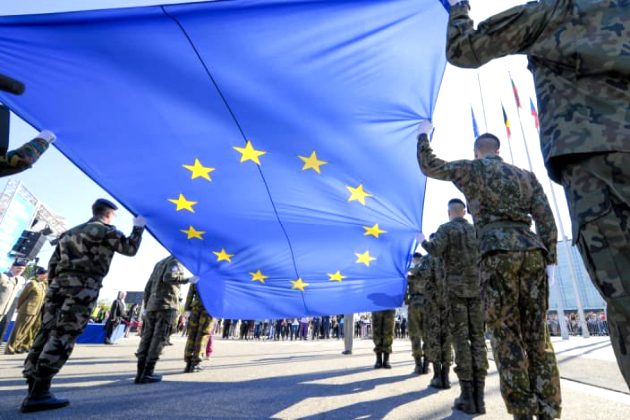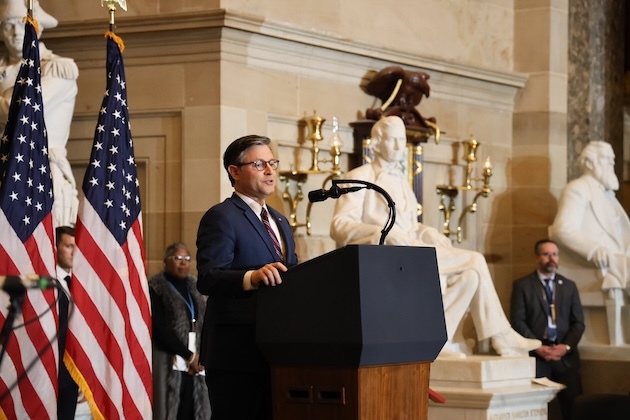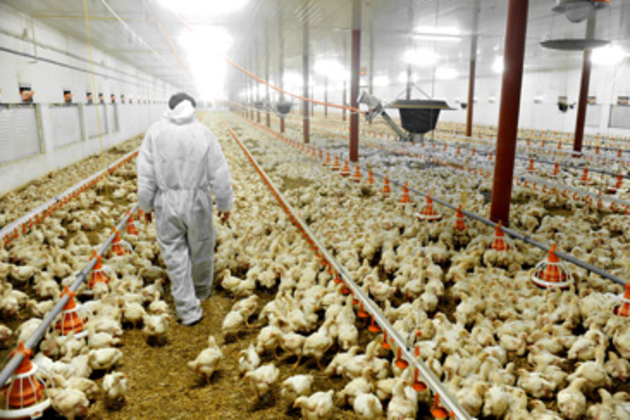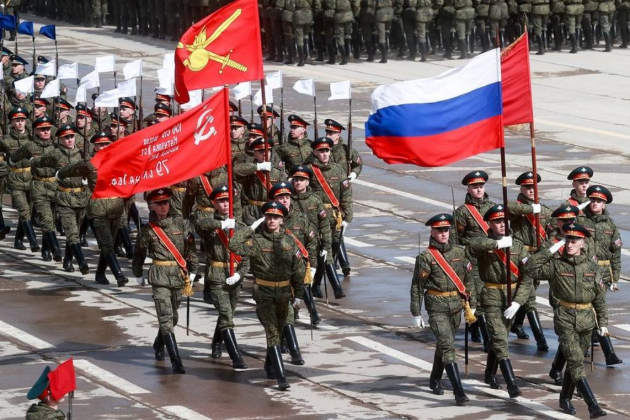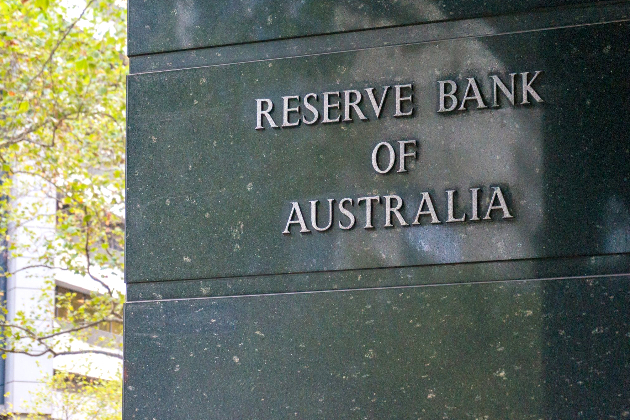Trump's tariff measures do not shatter WTO and world trade
CGTN
20 Feb 2025, 07:10 GMT+10
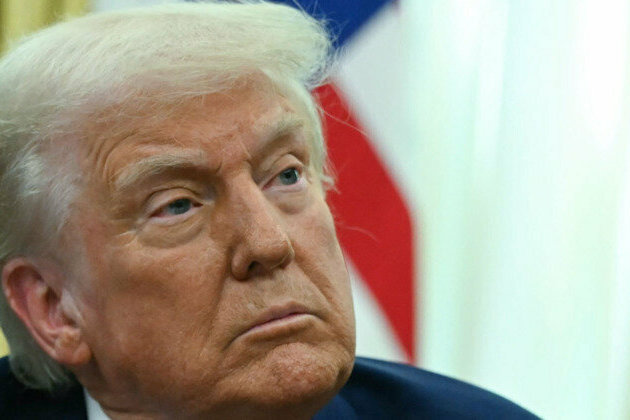
US President Donald Trump speaks in the Oval Office of the White House as he announces reciprocal tariffs, in Washington, DC, February 13, 2025. /VCG
Editor's note: He Weiwen is a senior fellow at the Center for China and Globalization. The article reflects the author's opinions and not necessarily the views of CGTN. It has been edited for brevity and clarity.
In his second term, US President Donald Trump has imposed sweeping tariffs on imports, starting with a 25 percent tariff on Canadian and Mexican goods and 10 percent on Chinese imports on February 1, 2025. He has also expanded tariffs on steel and aluminum, followed by reciprocal tariffs, and is expected to impose a 25 percent levy on automotive imports. These measures have sparked strong opposition from China, Canada, Mexico, and the EU, with the European Commission threatening retaliation. US Senate Minority Leader Charles Schumer has criticized Trump's approach as "the most stupid trade war in history."
WTO and multilateral trading system under threat
Trump's tariff actions represent the most significant challenge to the World Trade Organization (WTO) and its multilateral rules since the establishment of the General Agreement on Tariffs and Trade in 1948. Central to the WTO system is the principle of non-discriminatory trade and unconditional Most-Favored-Nation treatment, which Trump's tariffs violate. The WTO also rejects the idea of "reciprocal tariffs," a concept Trump has championed without WTO support.
To bypass the WTO's oversight, Trump effectively paralyzes the Appellate Body, preventing legal challenges to his tariff measures. The scope and severity of these tariffs undermine the WTO's core principles and threaten global trade stability, harking back to the disastrous Smoot-Hawley tariffs of the 1930s.
Absurd and illogical justifications
Trump's justifications for the tariffs are flawed:
1. Stopping illegal immigration and fentanyl: These issues have no direct link to trade, particularly with China.
2. Protecting US industry: Steel and aluminum tariffs failed to boost US industry during Trump's first term, and the US manufacturing remains sluggish.
3. Reducing trade deficit: Despite tariffs, the trade deficit increased substantially under Trump.
4. Fair trade: Reciprocal tariffs are a thinly veiled form of unilateral tariffs, violating WTO principles.
Economic consequences of Trump's tariff war
Trump's tariffs have already had damaging effects:
1. Tariffs are paid by US importers, who will ultimately pass the cost onto consumers and manufacturers.
2. The Peterson Institute for International Economics estimates that Trump's trade war will cost each American family $1,200 annually.
3. US imports may drop by 55 percent, and exports by 30 to 60 percent, should retaliation intensify, reminiscent of the Great Depression's trade collapse, according to Bloomberg estimates.
WTO and global trade remain resilient
Despite Trump's aggressive tariff policies, the WTO and global trade are far from being toppled:
1. The US accounts for only 12.9 percent of global trade, and even if its imports were completely tariffed, the majority of global trade would remain unaffected.
2. The US is just one of the 164 WTO members, and the overwhelming majority of countries and regions continue to support the WTO's rules and mechanisms.
In 2023, global trade reached $30.4 trillion, with trade growth driven by middle- and low-income countries. These trends reflect the enduring strength of the WTO and the multilateral trading system, which will continue to thrive despite the challenges posed by Trump's tariff policies.
Source: CGTN
 Share
Share
 Tweet
Tweet
 Share
Share
 Flip
Flip
 Email
Email
Watch latest videos
Subscribe and Follow
Get a daily dose of Africa Leader news through our daily email, its complimentary and keeps you fully up to date with world and business news as well.
News RELEASES
Publish news of your business, community or sports group, personnel appointments, major event and more by submitting a news release to Africa Leader.
More InformationInternational
SectionTaiwan defends Strait’s status after China criticizes Canada
TAIPEI/BEIJING: Taiwan's defense ministry said this week that the Taiwan Strait does not belong to China, and any attempts to create...
No unified European army despite Russian threat, says Polish FM
WARSAW, Poland: European nations will not form a single, unified army despite growing security concerns over Russia, Polish Foreign...
Speaker Mike Johnson: Western survival hinges on national priorities
LONDON, U.K.: Republican U.S. House Speaker Mike Johnson said this week that Western countries must focus on their national interests...
First human H5N1 case confirmed in Wyoming as bird flu spreads
CHEYENNE, Wyoming: The state reported its first human case of Type A H5N1 influenza, which is spreading through animals and some people...
Europe faces hard choices amid rising threats, warns French FM
MUNICH, Germany: Speaking at the Munich Security Conference, French Foreign Minister Jean-Noel Barrot warned that Europe must brace...
Mine collapse in western Mali kills at least 43, mostly women
BAMAKO, Mali: A tragic mine collapse in western Mali, West Africa, has claimed the lives of at least 43 people, mostly women, an industry...
Business
SectionThames water secures legal lifeline, avoids collapse
LONDON, U.K.: A judge has approved an emergency financial plan to prevent Britain's largest water company, Thames Water, from collapsing,...
U.S. stocks tumble as Trump policies startle investors
NEW YORK, New York - Concerns over U.S. President Donald Trump's startling diversions from his country's long-held policies, and the...
Southwest Airlines cuts 1,750 corporate jobs in first-ever layoffs
DALLAS, Texas: Southwest Airlines is laying off 1,750 employees, or 15 percent of its corporate staff, in the company's first significant...
Australian central bank cuts interest rates for first time since 2020
MELBOURNE, Australia: Australia's central bank has cut its benchmark interest rate for the first time in more than three years, signaling...
Brazil joins OPEC+ ahead of key UN climate summit
BRASILIA, Brazil: Brazil has officially approved joining OPEC+, aligning itself with the world's major oil-exporting nations just months...
U.S. stock markets in sharp retreat Thursday
NEW YORK, New York - U.S. stocks fell sharply Thursday as profit-takers moved in to take the cream off the substantial gains that have...


